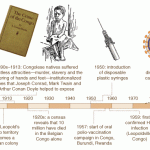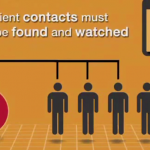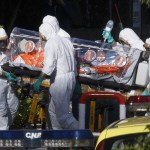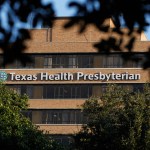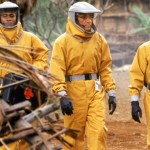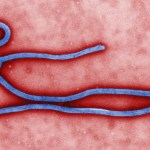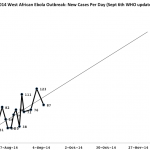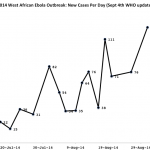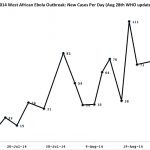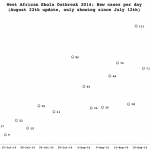Ebola
Jim Moore and I were both students in the PhD Program in Anthropology at Harvard a few years ago. He graduated about the time I entered the program. To give a rough historical touchstone, I remember the day he needed to get his thesis off to the Registrar, and there was a delay because it was taking longer than expected to deburst the pages fresh out of the printer. Anyway, Jim is Professor of Anthropology at UC San Diego, and has done a great deal of work with Old World Primates, the evolution of social systems, and related topics. A while back Jim wrote an important piece for American…
Of the seven Americans who have contracted Ebola, five overseas and two in Texas, all seven have survived. Comments from President Obama, focusing on how we have to be guided by the science:
"Here’s the bottom line. Patients can beat this disease. And we can beat this disease. But we have to stay vigilant. We have to work together at every level — federal, state and local. And we have to keep leading the global response, because the best way to stop this disease, the best way to keep Americans safe, is to stop it at its source — in West Africa."
CDC Update page for the West African outbreak…
Obama made Ebola the subject of his weekly address. He emphasizes some unique concepts: Science and facts.
Given the current and developing situation in Dallas, where two health workers have become infected with Ebola while caring for a patient, it is reasonable to ask if health workers might decide to call in sick for a few months until this whole highly infectious often fatal disease thing blows over. Daniel Barnett, of the Department of Environmental Health Sciences at the Johns Hopkins Bloomberg School of Public Health, has looked into health workers’ unwillingness to report to work when there is a potential for infectious-disease transmission to themselves and their family members.
The…
UPDATE: The first health worker to have been affected with Ebola in Texas may not be moved to Maryland.
From NBC:
Nina Pham, one of the two nurses who contracted Ebola in Dallas, is expected to be moved to a National Institutes of Health isolation unit in Bethesda, Maryland, a federal official with direct knowledge of the plans told NBC News on Thursday.
The transfer could happen later Thursday, but the official cautioned that plans were evolving. Pham, 26, was diagnosed with the virus on Sunday after treating Thomas Eric Duncan, who contracted Ebola in Liberia, flew to Dallas and later died…
This is breaking news as of Tuesday PM. According to the nurses at the hospital, no, not initially. Anonymous nurses have claimed via their union:
-Patient Zero was left for several hours in a place with up to seven other patients, not in isolation. When a senior nurse attempted to insist he be moved to an isolation unit she was met with "hostile" responses.
-Blood samples were transported through the hospital tube system instead of hand carried.
-Nurses were not entirely covered with protective wear. The gear they had left their necks exposed. To remedy this they were told to wrap tape or…
The first person ever to catch Ebola in the United States is now in isolation at Texas Health Presbyterian Hospital.
Don't panic, even if you live in Dallas. But also, don't fall into the hyperskeptical trap of assuming that because scientific authorities tell you everything is fine that concern is irrational. There are very rational reasons to be concerned. But you need to be smart about what to be concerned about.
A couple of weeks ago, as you know, a man came to Dallas with pre-symptomatic Ebola, and became symptomatic there. This was the first case of a person being diagnosed with…
According to those intimately involved in the response to the West African Ebola outbreak, NewLink Genetics owns the rights to a piece of the puzzle needed to quickly test and deploy one of two likely Ebola vaccines and they are holding up the entire process because they are not entirely sure they are going to get rich on it. Other suggest it is incompetence. NewLink seems to be claiming it is just a lot of paperwork. In the end, tough, none of these excuses is convincing. This is one of those cases that gives Big Pharm a bad reputation.
From as story in Science:
Stephan Becker is tired…
UPDATE: They killed the dog.
UPDATE: I'm adding this here because it is my current post on Ebola. Thomas Eric Duncan, the person who became symptomatic with Ebola in Dallas, had died at the Texas Health Presbyterian Hospital (according to news alerts).
A nurse's assistant in Spain caring for Spanish nationals returned with Ebola from West Africa contracted the disease, gaining the dubious distinction of being the first person to be infected with Ebola outside of that disease's normal range in West Africa, Central Africa and western East Africa. There is speculation that she contracted the…
I used Google N-gram Viewer to inspect the occurrence of the word "Ebola" in the Google-indexed literature. A few instances of Ebola came up earlier than the disease being known, so I figured they were references to the place name in Zaire/Congo, after which the disease is named. And that was in fact the case. But, of handful of early instances I checked out, two were interesting.
The Ngram is above. Note that I have smoothing set to zero, which I recommend, and I've got the date set for early on in the use of the term so pre-disease uses are more visible.
The two interesting instances I…
According to popular literature (some fiction, some not) and movies, Ebola can cause havoc, infecting thousands of people, killing over half of them, and threatening an entire nation if it were to become airborne. Turns out that's not true. Ebola can do all those things without becoming airborne. In several nations.
The confusion caused by this misconception is further enhanced in a more subtle way. Since the Hollywood version of Ebola (or some other similar disease) indicates that it is dangerous because it becomes airborne, we see constant claims today on the Internet that Ebola must be…
First, let’s look at the situation in West Africa, because that is way more important than anything going on in the US right now. The WHO has said two things about this. First, if there is not a full intervention, there may be hundreds of thousands or even millions of cases of Ebola several months from now (cumulatively). Second, with full intervention they can stop this epidemic.
What is full intervention? They say that full intervention is the development and manufacture of an effective vaccine, and the deployment of that vaccine to a very large percentage of the affected population.…
This discussion has been going on for some time, and a handful of recent events have prompted me to jump into it (beyond a simple comment or two). First, I saw a bunch of yammering among various biology teachers about this topic. Then Michael Osterholm wrote a well intentioned but seemingly deeply flawed opinion at the New York Times, then Dina Fine Maron wrote an excellent piece at Scientific American deconstructing Osterholm's piece, then the latter two (and more) were summarized and expanded on in a post by Ann Reid at the NCSE.
Here, I will expand on this by applying first principles…
Just a quick note. The UN Security Council has ad its first ever emergency meeting over a health issue, specifically the current West African Ebola outbreak. From a summary in Science, the Council ...
... unanimously passed a resolution that declared the spread of the virus a “threat to international peace and security” and called on the world to send more health care workers and supplies to Liberia, Sierra Leone, and Guinea, and not to isolate those countries.
...
U.S. Ambassador to the United Nations Samantha Power, who chaired today's meeting, noted that the resolution had 130 co-sponsors…
In the earlier days of the West African Ebola outbreak, it was not uncommon to hear people note that we should not panic about Ebola because, after all, far more people are killed from Malaria than Ebola. This is of course an irrelevant argument. That is like telling a person who has lost their family in a tragic airplane accident that it isn't so bad because, after all, far more people die in car crashes than aircraft crashes. For example, on August 5th, James Bell write in the Guardian, in a piece called Concerned about Ebola? You’re worrying about the wrong disease:
Since the Ebola…
The news is bleak. I don't have a lot of confidence in the reported numbers. At one time it was said that on a nice Saturday in the summer, four out of five cars driving around in downtown Boston were looking for a parking place. This is somewhat like the situation in Liberia and possibly other affected areas. There may be as many Ebola victims driving around in taxis looking for a clinic as there are in clinics. Or maybe a fewer. Or, maybe more. Maybe a lot more.
But, we have to work with the data we have. There are two charts based on the information provided by WHO for up through…
I'm just posting the graph and very little info right now. The per day rate of new cases is currently about 123 cases per day, the total number of suspected, confirmed, etc. cases is 3,685 with 1841 fatalities. These numbers no longer include Nigeria (and the one case in Senegal is not included either).
WHO has put out very few updates in the last several days. The most current update is August 28th, and it pertains to information from August 26th and before. Based on that update, the total number of cases (confirmed, suspected, etc.) is ow 3069 with 1552 deaths. The number of new cases per day may be increasing, may be decreasing; hard to say at this point. Here's the new cases per day since the second week of July:
Senegal now has one case, a person who traveled there from Guinea. He had contact with a lot of people including health workers and family before it was figured he may have…
We can now be pretty sure that the Ebola outbreak in the DR Congo is not an extension of the West African outbreak. The index case seems to have gotten the disease from a mammal she butchered, and the numerous other cases seem to stem from contact with her primary as health care workers and family members. I don't think we have enough information yet to assess this outbreak vis-a-vis the genetics of the Ebola itself.
From WHO:
On 26 August 2014, the Ministry of Health, Democratic Republic of the Congo (DRC) notified the World Health Organization (WHO) of an outbreak of Ebola virus disease (…
The number of people known or suspected to be infected with Ebola in the West African outbreak is increasing, and the rate at which it is increasing is increasing. About 40 new cases are being reported per day on average, but the number of new cases has been going up by a few a day.
However, it is still unclear that these numbers represent what is actually happening on the ground. There is little confidence that the WHO has a good idea of who is currently stricken with the disease, and efforts to contain those who are have had mixed results.
A second outbreak is now occurring in the DR…
